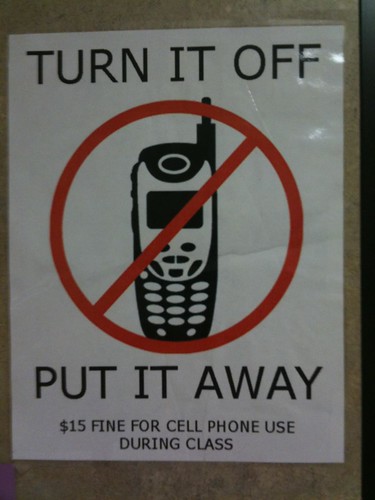I’ve been mulling over the story above since I heard it Thursday. The gist is different classrooms or schools are buying pouches and requiring students to put their phones in these pouches, which can’t be unlocked until the end of class or the school day. NPR’s Tovia Smith reports on the trend, and it’s not difficult to understand why it got picked up.
The story plays on educators’ worst fears – laziness, lack of student attention, fighting against social media, “addiction” to tech. They’re tropes, and the pouches are a novel iteration of signs like the ones below.
The story also misses an opportunity of the sort outlets like NPR pride themselves on – having the better conversation. In improvisational theater, it’s called moving from A to C. At some point in her reporting, Smith says:
DeCopain says students are more engaged, and some are starting to see the virtue in the pouches – sort of.
The “virtue of the pouches”? Aside from what I hope will be the title of an animated film about world-saving kangaroos, this is where the story misses an opportunity. In these 5 minutes, there’s no mention of the virtue of helping students self-regulate, there’s no mention of the virtue of teachers leveraging the fact students are bringing their own computers to class, and there’s no mention of the virtue of teachers considering how these devices make questions like the featured practice problem “X to the third power minus 13-X” exceedingly irrelevant (if they ever were).
The only counterpoint the story is Cal State’s Larry Rosen warning restrictions like the pouches could inspire “massive anxiety”, because children are fragile. Rosen’s suggestion of “tech breaks” further paints the picture that smartphones only serve as a distraction and have no practical use in the classroom, an argument we should be done making at this point.
My entire experience listening to the story, all I could think was, “This is completely letting teachers off the hook from improving their practice as professionals in modern schools,” and “We’ve found another way to make schools like prisons.”
I’m not so ignorant as to expect edtech stories (pouch stories) like this won’t get picked up by even the most reputable of news organizations. I’m not yet willing to let go of an expectation of full, thoughtful, balanced reporting when a story has many perspectives.
